| |
"Although Resurrected was his first theatrical film, he had honed his craft making political documentaries for the BBC*. While his style is definitely assured, the work exudes a more sombre and temperate pacing, much less flashy than his shaky cam, docu-style actioners Green Zone, Captain Phillips, and the Bourne sequels. Here, his later trade -mark verité moves would have felt excessive and unnecessary." |
| |
Wade Sheeler, The Retro Set** |
First of all, a nod to Paul Greengrass for founding Director’s UK in 2007, an organisation I’m subscribed to that recently made headlines by setting out guidelines for shooting intimate scenes between actors. He was the right man at the right time doing the right thing so there’re acres of respect before we even get into reviewing his first feature. Greengrass’s career exploded with the high-octane sequel to a franchise that effortlessly out-Bonded Bond. The Bourne Supremacy is by far, in my opinion, the superior entry in the series. Oft-derided by many, the shaky-cam aesthetic in modern cinema is generally something of a blight but in Greengrass’s hands, filtered through the supreme talent of editors Richard Pearson and Christopher Rouse, it is used to stunning effect in the film. The style serves as a constant metaphor of the fractured mind of the protagonist. I sort of accepted that this kind of talent is the bud at the end of a branch of a mature tree. The camera, quelle surprise, is rock solid throughout Resurrected. The sapling had to take root somewhere.
Partially based on the ordeal of soldier Philip Williams at the Battle of Tumbledown in the Falklands War of 1982, Resurrected tells the story of a soldier on the islands during a fire fight risking his life to move the injured to safety. He claimed after some months to have been lost and suffering from amnesia. We meet the protagonist, Kevin Deakin, approaching a Falklands property where the British owner is armed and prepared to defend his home and family with double-barrelled violence. It soon becomes clear that Deakin is no threat and he is transported back to the UK with a dark ambiguity hanging over what actually happened to him, which is now in the public arena of speculation. The media, which in this instance would rather have a hero than a cowardly deserter, big Deakin up. It’s too much for Deakin to blow back against so he becomes this ineffectual critic of his own falsified status. The only people who seem to care about the truth, care for their own ends. Could Deakin have let the side down? If so the reputation of his regiment was at stake and some of his fellow soldiers take that all too seriously. Deakin tries to re-establish his life pre-war but after the cloud of distrust sends torrents of doubt raining down on him, he has little choice but to take what may be coming to him.
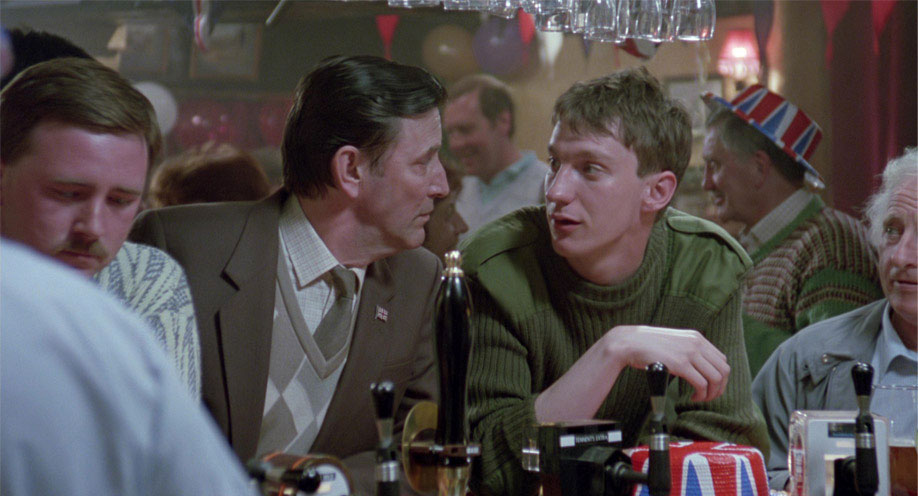
Marketing for the Armed Forces has long been based on the idea of camaraderie, cohesion and ultimately family (though not out loud). The adverts have been emotional and rather well devised to appeal to a certain mind-set I have to say. That sounds appallingly condescending. Never mind. But along with that buttressed sense of “we” comes the danger of the depth of split one member of the team could cause by being perceived to be less than the whole. Two things to say on this: In Oliver Parker’s utterly delightful and funny Swimming With Men, one of the team members, Ted (Jim Carter) says something close to “We’re only as strong as the weakest member of the team and he is strong enough,” which is the liberal way of expressing unity through social inclusion. On the flip side of this is the cognitive dissonance some brainwashed souls have to exhibit to pretend their beliefs are still held in place given the inevitability of human psychological weakness and frailty. The American Marines (or rather Hollywood’s fictional Marines) featured as a physical and mental ideal in Rob Reiner’s A Few Good Men, present a strong, united front. Their code is vitally important to the health of the whole, so much so that a lesser Marine has to be brutally beaten to suggest that his standards need to improve. He dies in the assault and at the hearing his commanding office says “Santiago was a sub-standard Marine.” Given all the fuss and awe over the actual training to become a Marine, isn’t it an oxymoron to say “sub-standard Marine”? Let’s forget about impossible ideals and concentrate on the human side of things. A military ideal is one thing. Persecution of someone who may or may not fall from that ideal is another. A young man’s life is falling apart and his once tight military unit is edging out his own mind for the top spot as chief tormentor.
As Kevin Deakin, a young David Thewlis is starkly good. There’s no experienced twinkle in his eye as he exhibited many years later as Defence Against The Dark Arts Master, Professor Lupin from the Harry Potter series. These days he’s probably more recognisable as the god Ares, the belatedly revealed antagonist of Wonder Woman. What Thewlis brings to the role of Deakin is just the right amount of confusion, fear and an initial unsympathetic nature. The latter forces the audience to make up its own mind as to whether we think he’s faking the amnesia to cover his cowardice or if he’s being maligned unfairly for being brave in the face of enemy fire and experiencing one explosion too many, too near. If this were the young Robert Redford, we’d know he was a hero. Thewlis? Not so sure. His girlfriend Julie, played by Rudi Davies, is the first human barometer of Deakins’ mental state. Sex is affected of course, a small aspect that taps the wedge between the two lovers. Davies was the striking red headed home help in The Lonely Passion of Judith Hearne. She didn’t have great experiences in her love life in that film either. Deakin’s parents are played by two of the UK’s most renowned character actors. Tom Bell, famous for clashing characters with Helen Mirren in the Prime Suspect series, plays Deakin’s father, somewhat bowled over by events and, against type, he is very much crushed by the circumstances of his son’s position. Ever wide-eyed and instantly recognisable despite the march of time is Rita Tushingham who came to prominence in 1961 with a stand out performance in A Taste of Honey. As Deakin’s mother, she’s a bit more pro-active but still a pawn on the military chessboard, a player no one in the regiment cares about. Nice to see Zaphod Beeblebrox (minus a head), Mark Wing-Davey as the ‘military liaison to civilians’, Major Dundee. Corporal Byker (Ewan Stewart) tries to let military justice take its course (I believe this was known as a ‘drumhead’ where mob rule was meted out regardless of the truth). I miss truth. It had integrity to it. Must remember to write it a Sympathy card… “Sorry for our loss… but you are coming back, right?” Deakin’s adversary in the barracks is Slaven (Christopher Fulford) whose explosion of tightly held disgust gets a round of applause from the men. That tells you all you need to know about the short-term future life of a suspected deserter. The little firecracker of a shock was seeing ‘Youth 2’ pop up in a few scenes. Resurrected was the acting debut of a certain Alan Partridge, (Steve Coogan).
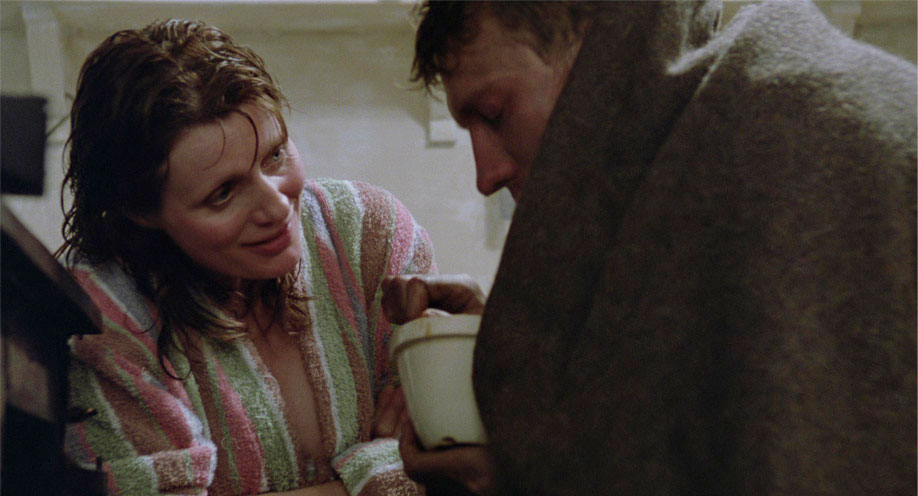
Technically, the film is well made with a few too many mixes covering awkward changes in camera direction at the start of the film. But Greengrass’s command of craft and cast is exemplary. There’s not a moment of dishonesty in the drama and its effectiveness means you’re wincing some of the time fearing what’s covering. Flashbacks to the war zone are not aided by a lack of resources but for what those flashbacks have to do, they do it well given what was on hand to realise them. Martin Allen’s script is no nonsense with no grandstanding speeches, just a presentation of a man’s getting to grips with how easily others can see what they want to see. Dan Rae’s editing is suitably invisible (I cannot help my sensitivity to mixes) and in terms of editing that’s always a plus. Ivan Strasburg’s photography is naturalistic and it’s so nice to temporarily consign the colour teal to the present (as we indulge in the past). John Keane’s music is very sparingly used but that’s often a sign of filmmaking maturity. There is a lot of diegetic music (hymns and 80s hits as well as a rousing, drunken rendition of Sailing by the soldiers) but a relatively few number of original cues, some of which mix in so softly, you’re barely aware they are there. The more pronounced cues signal a change in Deakin’s behaviour, a lever pulled to shift him into the next situation he has to face to move forward. As the Blu-ray is not out yet, I wonder if the cover artwork will stay as is shown on Indicator’s web site. It’s striking and lurid enough to attract the most attention but does it do the film a service? I’ll leave that one hanging with some very silly advice. If you receive the film in a jiffy bag, take it out with your eyes closed, tear off the cellophane… Oh. Wait. We show the cover on this page of the review. Duh. Forget I said anything.
Resurrected is a fine drama with strong performances, and marks a conspicuous debut by one of this country’s finest directors. It’s well worth checking out.
This 1.85:1 presentation was originated on 35mm film (the still of Greengrass next to a 35mm camera in the Gallery confirms this) and remastered in 1080p HD by Film Four from which this transfer originated. The image quality is warm with a natural colour palette and a pleasing contrast. There is no significant grain to be concerned about. If you expose it correctly, 35mm film is awfully rewarding and even if you don’t it’s still very forgiving.
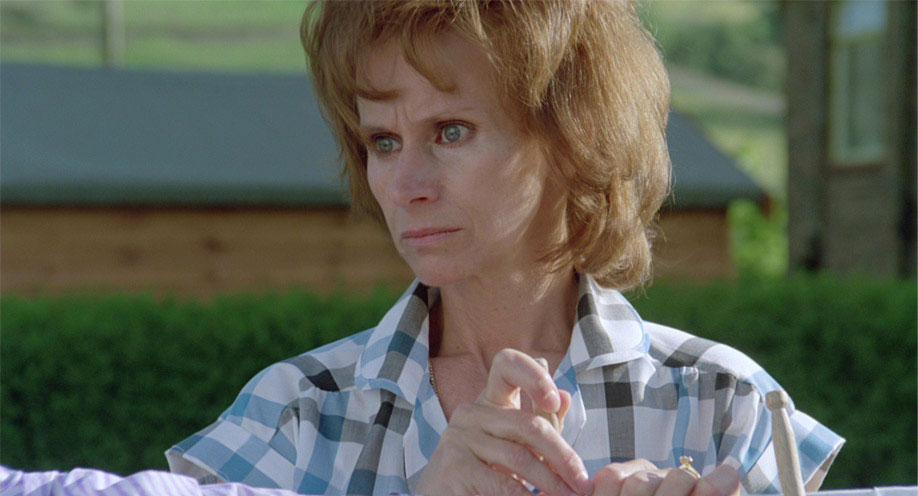
The remastered stereo soundtrack is crystal clear with very little for the sub to do and no particular dynamic range issues. It’s a professional mixing job, which may have benefited from a few bells and whistles in the war flashbacks but everything works as is. And works well.
There are new and improved English subtitles for the deaf and hard-of-hearing.
Paul Greengrass on Resurrected (2011): archival interview in which the director discusses the origins and creation of the film (18’ 30”)
Greengrass takes us through his early career steps including the nurturing context of Granada TV and the importance of Film 4 and David Rose to him getting his chance to direct a real movie in his late twenties. Greengrass had an interest in conflict and especially institutionalised bullying which led him neatly to Resurrected. There followed a fallow period in which he spent writing to learn his craft and while admitting his naiveté and the rawness of the movie, he is nonetheless proud of the work. “That was what I was meant to be doing,” is a familiar psychological place many filmmakers find themselves in. I had a small technical irritation watching this 2011 featurette. The focus drifts in and out as Greengrass leans forward and back. No biggie but I just though I’d mention it.
David Thewlis on Resurrected (2011): archival interview in which the actor examines the process of playing the lead role (16’ 39”)
Thewlis comes across as thoughtful and measured. It’s clear how much of a break this role was for him and his memory is pretty sharp. There are some lovely stories about Greengrass’s guitar and how clever the ‘regimental bath’ scene was in terms of make up application. He even notes Steve Coogan’s debut and the extra finishes on him in a freeze frame. In 2011, Alan Partridge was making a comeback… Finally he shows us a letter in his pocket recently received from soldier Philip Williams’ daughter who wants to know more about the filming. He makes an on screen commitment to reply. Cute.
Filming the Unthinkable (2020): new interview with iconic British actor Rita Tushingham (04’ 46”)
Hullo Rita! Unmistakable despite the years here is Rita, eyes still large and a spirit undimmed. She introduces the film and its premise and shares a few impressions and memories of working with her co-stars. She notes the difference between filming on location and a set and wonders whatever happened to the dignified Philip Williams…
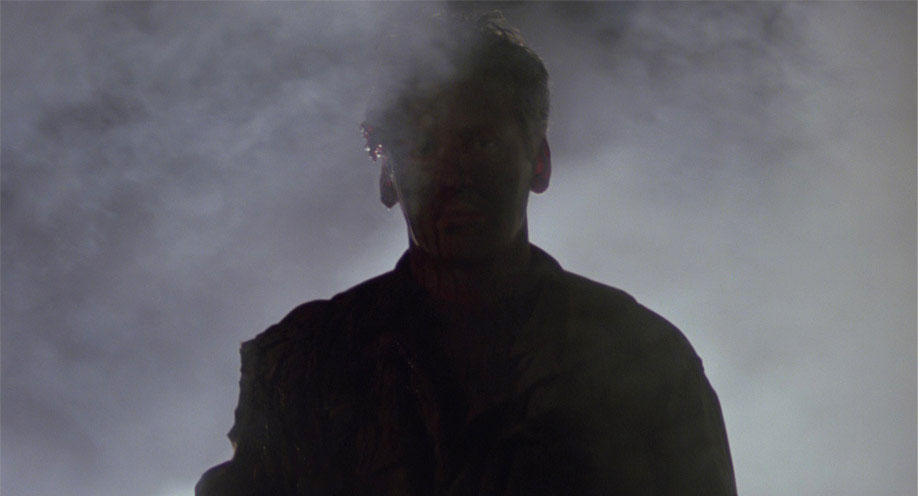
The IWM Oral History with Philip Williams (1992): archival audio recording, made by the Imperial War Museum, featuring the real-life inspiration for Resurrected recalling his experiences in the Falklands War (1 hr, 6’ 35”)
This is a fascinating inclusion, an insight into the mind of the soldier whose experiences the film is based on. He talks about not feeling close with his colleagues (that’s a no-no right there) but he does describe his regiment in exactly the same way I might if I’d seen this film – loud, casually racist and seeing anyone without those attributes as outsiders. Williams says he was excited to see another country which reminds you that most armies are just men who are barely out of their borders, let alone their teens. He volunteered as a stretcher-bearer rather than provide covering fire for others. He describes almost exactly the experience, trying to get the wounded out of danger and then bang – an explosion, pain and suddenly it’s a few days later. It’s interesting that he or the interviewer never mention amnesia so perhaps that’s the one flimsy shield that kept aggressive forces at bay in the fictionalised version of Williams’ story. Without Williams’ knowledge the war ended and he was alone on the islands, freezing, tired, in pain and hungry for seven weeks. His experience gave Williams some insights; he felt the Forces personnel were treated cheaply by public and employers alike and that they were ‘the heroes in green’ and nothing more.
Williams strikes me as innately intelligent if not overly educated (he uses the word “cowardism” and a few other giveaways) but he clearly speaks from experience and has a few powerful insights. He mentions something that could be taken issue with, that no aggression ever solved a political problem. World War I, World War II? And aggression did wonders for Thatcher’s popularity. God the 80s were gruelling. The last word goes to Williams who says that he “…wasn’t their deserter or hero… That’s what I think.” 2020 is the wrong year to insert nuance into the conversation.
Original theatrical trailer (2’ 36”)
With sparse voice over top and tailing and no text cards, this is an artfully told narrative, with standard definition picture and muffled sound, which sells the film very satisfactorily. It’s all here (but then the public need not know that). There’s one cut where you can imagine whoever cut the trailer was having a bit of fun. Thewlis closes in for a kiss, cut to injured soldier ‘cine-puking’ (the art of holding stuff in your mouth and then spitting it out rather than the uncontrollable ejection from the gut) followed by the second part of the kiss. Mmmm. Thanks for that.
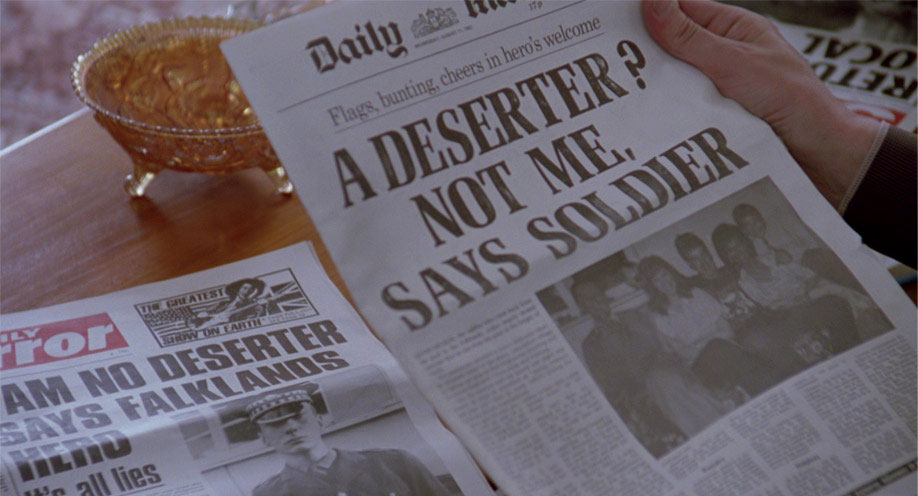
Image gallery: publicity and promotional material
23 colour cast stills, one of a young Greengrass followed by 15 screens, totalling 28 pages of synopses, cast info and producers and director bio. One rather nice poster rounds off the collection.
Limited edition exclusive 36-page booklet with a new essay by Julian Petley, Paul Greengrass and screenwriter Martin Allen on Resurrected, extracts from an archival interview with Philip Williams, an overview of critical responses, and film credits
Julian Petley’s article The Ghost at the Feast gives a comprehensive background of the film’s production and how well set up Greengrass was to direct it. He compares Resurrected with other work that takes the Falklands War as its catalyst or inciting incident and makes the observation that this last piece of British colonial chest-beating was in fact an ugly hand-to-hand combat war more akin to the Somme than any modern idea of warfare. It’s also a safe bet that the country whipped up into a patriotic fervour by a government surfing on a war’s electric shock of self-pride, had probably never heard of the Falkland Islands before April 1982. The article mourns the loss of investigative journalism and a TV documentary strand that kept scepticism healthy and in the mainstream. I’m starting to think that 1982’s future was all about the consolidation of power and the gradual drip-drip loss of any aspect of society that questioned it. How in hell can we reverse that now?
Paul Greengrass and Martin Allen on Resurrected is a compilation piece of contemporary interviews taken from four sources. Greengrass reiterates how the government slowly closed down the kind of investigative journalism that held the powers-that-were to account. I love the Thatcher quotes that say it all really; on the World in Action team, “a load of Trots,” and the producers of Panorama, “…bastards!” Nice to know the religious iconography was all planned. Director and writer wanted to challenge the traditional image of the war of “Brave British lads, smashing the Argies, reclaiming sovereignty and therefore national pride,” to something far more nuanced. I’d say both managed that.
Summer Soldier by Philip Williams is the story from the horse’s mouth. Williams joined the Scots Guards at 17. I was one-dimensional at 17. From five different sources including Williams’ 1989 autobiographical corrective to all the jingoistic ballyhoo also named Summer Soldier, this is a fascinating article outlining Williams’ role in the making of the film (a few paid for rail rips and a lunch or two). He says he thought they’d go ahead with the film permission or not. The article ends with the sobering fact that Williams is still listed as one of the dead in St. Pauls…
Critical Response gives us extracts from the contemporary reviews (in a nice circularity, author of the first article Julian Petley was the critic who wrote a mostly favourable review in the BFI’s Monthly Film Bulletin featured first here). An unnamed Time Out reviewer said the following, the kind of remark that rubs me up three times the wrong way. “Although Greengrass’s direction is a shade televisual…” I would very much like someone to come up with a significantly better definition of ‘cinematic’*** and ‘televisual’**** than is currently offered, ones that have some practical meaning. Gravity is not televisual. OK. Eastenders is not cinematic. OK. But when critics use these terms it’s so hard to prise open what exactly was going through their minds. Was the subject too ‘dull’ for the big screen treatment? Too political (heaven forbid)? It reminds me so much of the successful wave of British film directors who all hailed from a commercials background so almost all critics then had a cheap pop at their movies for looking like adverts. It’s lazy even if it may seem true when responding to the work. I suspect the Time Out critic was inferring that the film was more suited to a Sunday night slot on BBC 2 but I saw a broader ambition at work here, which deserved its moment on the big screen.
Resurrected is an impressive cinematic debut from one of our most talented and committed directors. It features honest and convincing performances, a good and understated script and effective war scenes despite a paucity of resources. For those who like a little political bite in their war stories or anyone looking for a solid and somewhat harrowing drama, you’ve come to the right disc.
|